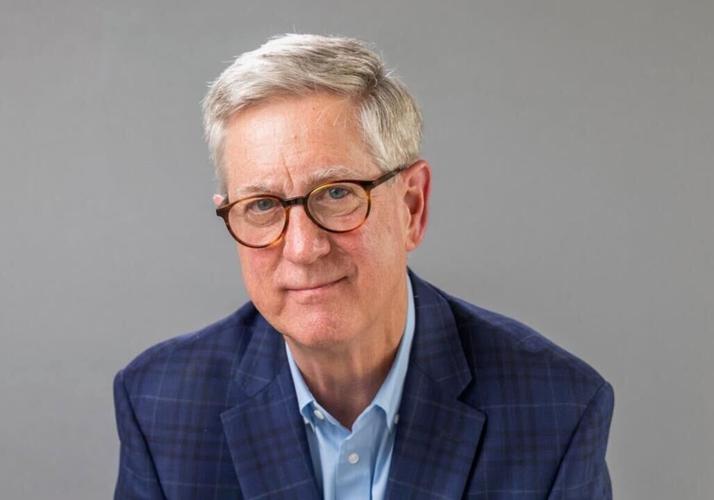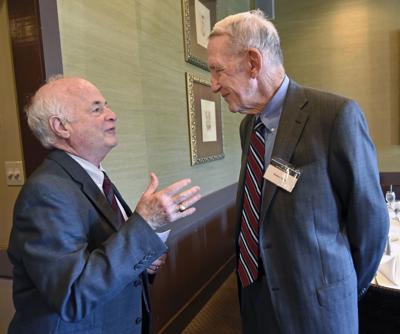Much has been written — deservedly so — about Bubby Henry’s transformative impact on the arc of Louisiana politics and government during his tenure as House speaker, chair of the 1973 constitutional convention, lobbyist and statesman. Not enough has been said of the man himself.
A self-styled “country lawyer,” Bubba represented the closest Louisiana has ever come to its own Abe Lincoln, partly because of his imposing physical presence but more so because of his keen political and people skills. And his hallmark sense of humor.
Like Lincoln, Bubba faced existential challenges without buckling under stress, used his sharp wit to charm friends and disarm foes and convinced warring interests to work together for the greater good — because friend and foe alike trusted him.
Most of all, he had an unshakable faith in a merciful, loving God. And unlike so many politicians today, Bubba didn’t wear his faith on his sleeve — he lived it. Quietly, humbly and courageously.
He was an early member and president (in 1994) of the Baton Rouge Federation of Churches and Synagogues, one of the oldest interfaith organizations in the nation. After the 9/11 terrorist attack, Bubba convinced the group to change its name to the Interfaith Federation of Greater Baton Rouge and include Islamic members.
Bubba donated to prison ministries and publicly opposed the death penalty — even speaking against it before legislative committees in the Capitol. He took a lot of heat for that and other principled stances, but he never wavered.
He participated in ecumenical Christian retreats. With his son Patrick, he made more than 30 silent retreats at Manresa, the pastoral Jesuit retreat house on the river road in Convent. The Manresa retreats, said Patrick, made Bubba realize how alike his own Baptist faith was to St. Ignatius’ spirituality.

Clancy DuBos
“He began reading Ignatius’ writings and letters and was inspired by them,” Patrick told me recently. “He loved to walk among the oaks at Manresa. Sometimes we’d take silent walks to the river levee. And every year we went to Manresa, he wrote me a beautiful letter. He would shove it under my door the night before the retreat ended.”
Patrick recalled that one of his dad’s last letters to him said, “After I’m gone, if you walk the oaks toward the river, meet me halfway … I’ll be there with you.”
Jeff Brooks, a lobbyist who worked closely with Bubba, told me that it was fitting for Bubba and Pope Francis — the Catholic Church’s first Jesuit pontiff — to have their funerals on the same day. Days earlier, Brooks had written to colleagues of Bubba, “I have never walked the Vatican with the Pope, but I came awfully close walking the halls of the Louisiana Legislature with Bubba Henry.”
Butch Speer, who worked for Bubba at the 1973 constitutional convention and later as the longtime clerk of the House of Representatives, saw firsthand Bubba’s rare combination of principled leadership and pointed humor.
“The Legislature went from a total clown show … to nascent independence under Bubba as speaker,” Speer recalled. He added, “If he had not been the person with his hand on the tiller at the constitutional convention, there’s no telling how that convention would have ended. Absent Bubba, I know we would not have adopted that constitution.”
At the same time, Bubba kept everybody guessing with his penchant for pranks. Speer said Bubba once gave him a paycheck for $1 and told him, “Here’s your pay, Speer. And damn if you’re not overpaid.”
Bubba also gave a staffer a gift certificate for $1,000 that was “redeemable anywhere,” and he had occasionally had House pages deliver phone messages to lawmakers with the number of the Baton Rouge Zoo on it, instructing them to call “Mr. G. Raff” right away, pranking lawmakers and zookeepers alike.
Nor was he above making a joke from the speaker’s chair. After a controversial bill to give lawmakers a pay raise narrowly failed, he announced, “I’ve never seen more people ‘praying yes’ and ‘voting no’ in my life.”
Perhaps no one saw all sides of Bubba more than Anne Cramer, his longtime assistant. “He stood on principle,” Cramer told me, noting that he had a playful side as well.
“Keeping his calendar was a challenge,” she said. “If I told him he had a conflict, he would say, ‘No, you have a conflict — you keep my calendar.’”
Cramer once confided to Bubba that she and her best friend “married two brothers.” To which he responded, “Each?”
I, too, was blessed to know Bubba on a personal level. We became professionally acquainted in the late 1970s and friends a decade later when Bubba, Patrick and I were guests at a mutual friend’s duck hunting camp. I treasure memories of those hunts, where Bubba shared many not-to-be-repeated anecdotes sprinkled with wisdom.
We’d often see each other in the halls of the Capitol where Bubba, in his country-lawyerly way, offered bits of advice, such as “Don’t trouble trouble until trouble troubles you,” and “Worry is a fast getaway on a hobbyhorse.”
Most recently, between 2018 and 2020, I had the honor of editing “The Last Constitution,” a book on the 1973 constitutional convention written by LaPolitics.com publisher Jeremy Alford and based on more than 700 pages of a daily journal that Bubba kept while chairing that convention.
The book (in which I have no financial interest) is a priceless time capsule from a pivotal time in Louisiana history — a time when a Lincolnesque country lawyer from Jonesboro led what Alford correctly dubbed “Louisiana’s greatest political generation” in drafting our state’s first forward-looking constitution.
So long, Bubba. You belong to the ages now.




